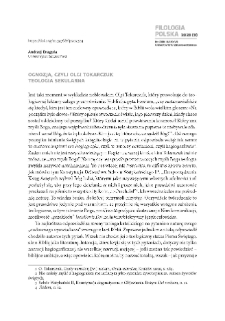Digital Library of Zielona Góra contains 65 553 digital objects
Object
Title: Ognozja, czyli Olgi Tokarczuk teologia sekularna = Ognosia, or Olga Tokarczuk`s secular theology
Contributor:
Gieba, Kamila (1984 -) - red. ; Rostkowska-Biszczanik, Kaja - red. ; Kaczor, Monika - red. nauk. ; Sztyber, Radosław - red.
Group publication title:
Abstract_pl:
Zarówno w wykładzie noblowskim, jak i w swoich esejach Olga Tokarczuk proponuje własną koncepcję literatury, którymi elementami są projekt nazywany przez nią ognozją, koncepcja narratora czwartoosobowego (panoptykalnego) czy też rozumienie i funkcja mitu, a szerzej - wszelkiej narracji. Jak sama przyznaje, jej koncepcję można uznać za alterreligijną. Ona sama odwołuje się do natury narracji biblijnej, aby - uciekając się do analogii - opisać własną koncepcję autora i innych składowych dzieła literackiego. ; Jej koncepcję można interpretować z punktu widzenia teorii literatury, ale także teologii. Niniejszy tekst jest próbą takiej właśnie interpretacji. Autor szuka paraleli pomiędzy literaturą w rozumieniu Tokarczuk a Biblią jako tekstem objawionym i spisanym przez hagiografa. W konkluzji autor stawia tezę, że nie jest to projekt postsekularny czy quasi-religijny, ale sekularny, a de facto gnostycki, ponieważ odwołuje się do wiedzy i kompetencji niby-boskiej jako fundamentu dla konstrukcji świata przedstawionego.
Abstract:
Olga Tokarczuk proposes - both in the Nobel Prize lecture and in her essays - her concept of literature, the features of which are the project she calls ognosia, based on a four-person (panoptical) narrator, or the understanding and function of myth, and more broadly - of all narration. As she believes, her concept can be considered as alter-religious. She refers to the nature of the biblical narrative to - resorting to analogy - describe her view of an author and other components of a literary work. ; The concept may be interpreted from the point of view of literary theory but also theology. The article is an attempt at such an interpretation. Its author looks for a parallel between literature as understood by Tokarczuk and the Bible as a text revealed and written down by hagiographers. In the conclusion of the sketch, a thesis may be found that Tokarczuk?s idea is not a post-secular or quasi-religious project, but secular and de facto gnostic, because it refers to the knowledge and supposedly divine competence as the foundation for the construction of the world presented.
Publisher:
Zielona Góra: Uniwersytet Zielonogórski, Instytut Filologii Polskiej
Format:
Resource Identifier:
DOI:
Pages:
Source:
Filologia Polska. Zeszyty Naukowe Uniwersytetu Zielonogórskiego, z. 9
Language:
License CC BY-NC-ND 4.0:
Rights:
Biblioteka Uniwersytetu Zielonogórskiego
Object collections:
- Digital Library of Zielona Góra > Repository > Faculties > Faculty of Humanities
- Digital Library of Zielona Góra > Repository > Types of work > Articles
- Digital Library of Zielona Góra > Repository > Scientific journals and UZ publishing series > Filologia Polska
Last modified:
Jan 19, 2024
In our library since:
Nov 13, 2023
Number of object content hits:
856
All available object's versions:
https://www.zbc.uz.zgora.pl/publication/84962
Show description in RDF format:
Show description in OAI-PMH format:
| Edition name | Date |
|---|---|
| Ognozja, czyli Olgi Tokarczuk teologia sekularna = Ognosia, or Olga Tokarczuk`s secular theology | Jan 19, 2024 |
Objects Similar
Ciupka, Stanisław Kulczycka, Dorota - red. nauk.
Gorzelana, Joanna Sztyber, Radosław - red. nacz.
Banot, Aleksandra E. Sztyber, Radosław - red. nacz.
Piotrowska, Anna G. Dudra, Stefan - red. Pochyły, Piotr - red.
Ruszczyńska, Marta Bielniak, Nel - red. nauk. Urban-Podolan, Aleksandra - red. nauk.
Trocha, Bogdan (1963- ) Sapeńko, Roman - red. Czeremski, Maciej - red.
Kowalczuk, Zygmunt Kuleba, Mirosław Waśkiewicz, Andrzej Krzysztof (1941-2012) Sobkowiak, Czesław Śmigielski, Wojciech Wesołowski, Jacek Szóstak, Anna Szmidt, Ireneusz Krzysztof Urbaniak, Paweł Lipińska, Alicja Łukasiewicz, Jacek Michałowski, Piotr Buchwald, Katarzyna Wojtyła, Konrad Wiatrzyk, Marta Grochowa, Agnieszka Benka, Urszula M. Kalinowska, Monika Frydryczak, Beata Cornakec, Jewa-Marja Rayzacher, Agnieszka Zuzia, Lucjan Tramer, Maciej Kwapisiewicz-Sevens, Anna Sławomir, Kufel Wojnarowski, Tomasz Tokarzuk, Olga
Tichoniuk-Wawrowicz, Ewa Kaczor, Monika - red. nauk. Kładoczny, Piotr - red. nauk.

